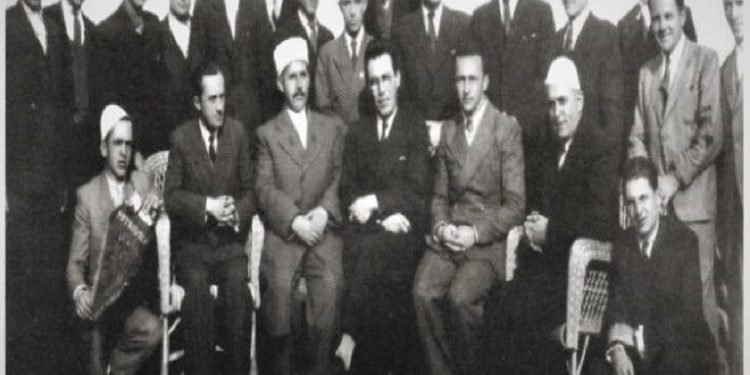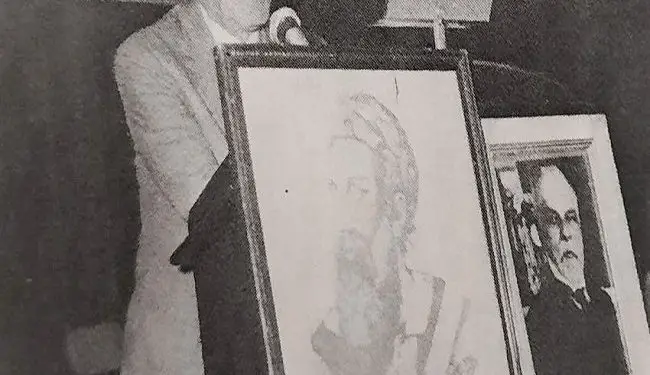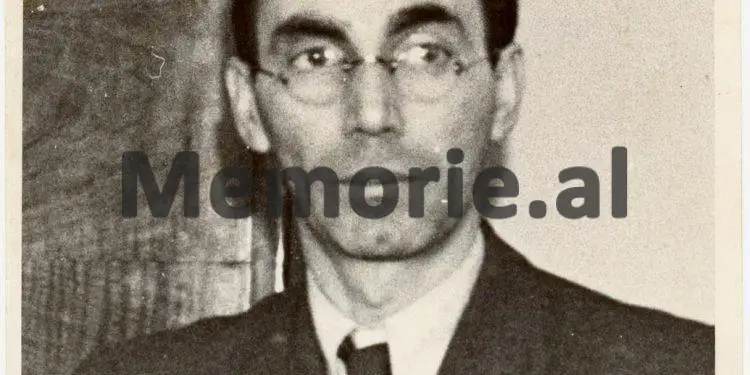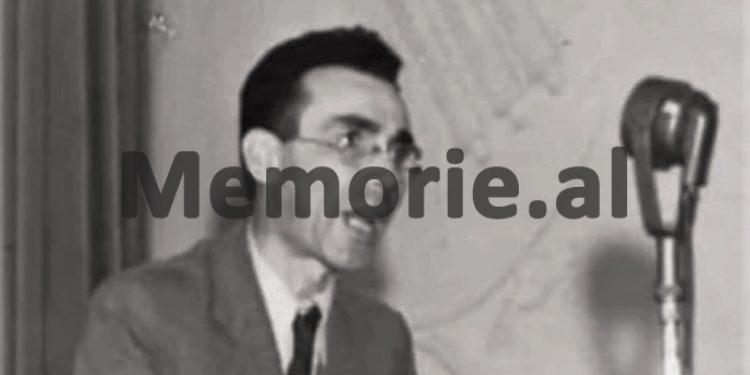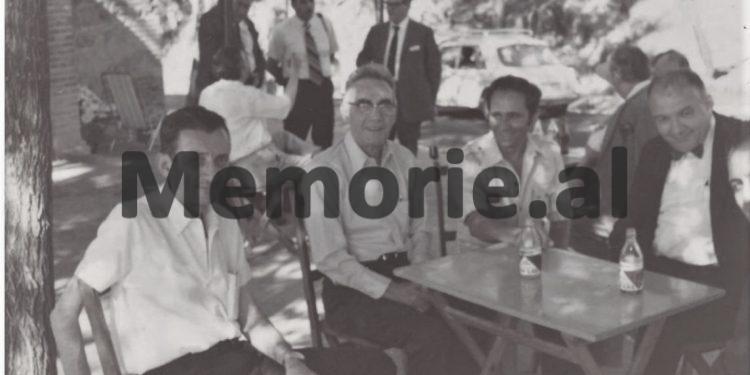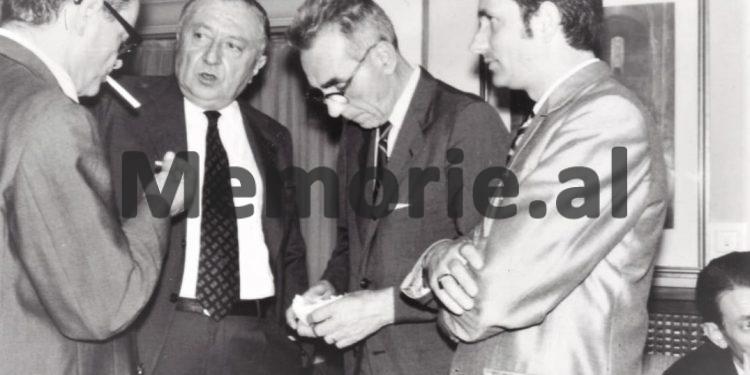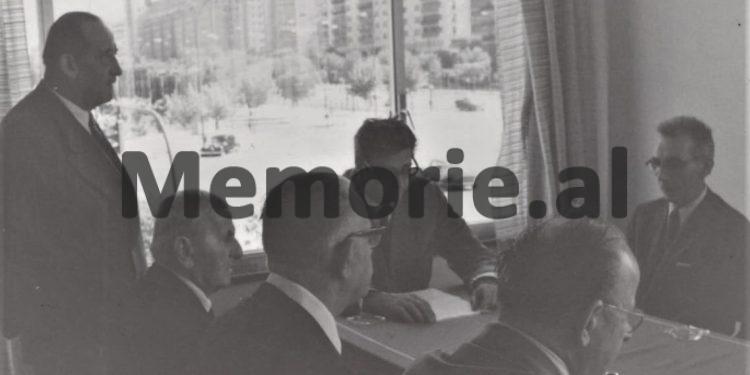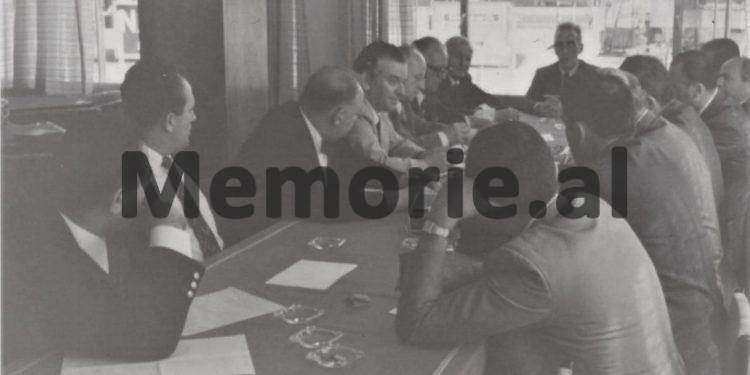By Idriz Lamaj
Part sixteen
From the works of the apostles of ethnic Albania
Xhafer Deva
In light of his own letters and other diaspora revelations
Preface
Memorie.al/ Probably like many others, I often browse letters with my friends and associates, who are no longer in this life. Browsing through them, for a moment unfolds memories that it seems to me that some of them can serve our history. Then, I return to the awareness of the current difficult situation in the ethnic homeland, caused by the quadruple of Albanian politics, I say to myself: “What can my memories of others or the letters of the people of dead? ”
Without being the ominous instigator of pessimism, thinking as always of a better future, I return to my obligations to my friends, and as an icy observer of time, without any claim of historical service, when I am given the opportunity of publication, write what I have in mind, always based on their writings and letters. This principle is also followed in this book about Xhafer Deva. I knew Xhafer Deva in person; we exchanged visits and had a strong correspondence.
I spent days off at his house and inherited all of Xhafer Deva’s correspondence with Rexhep Krasniqi, his closest friend, for more than 40 years. After many years, I talked on the phone with Mrs. Deva’s daughter and son-in-law. In the conversation going on, taking advantage of the old friendship, I asked about his letters and they informed me that it was all Qefali Hamdia, a friend of their family.
In June of last year (2001) I went to Kenosha, Wisconsin, a guest of Qefali Hamdia, to look at Xhafer Deva’s correspondence, which Mrs. Deva sent her years ago, when she, due to her advanced age, was closed his house to go to the house of his 5th daughter and son-in-law, Mrs. Burgl Dagmar and Rev. Dennis Logie.
After reading the bulk of the letters, in the languages I knew, I took with me more than a thousand pages of his correspondence, covering a period of over 30 years, 1945 – 1978. Xhafer Deva spoke and wrote seven – eight languages. His correspondence is: Albanian, English, German, Italian, French, Turkish and Serbian. Xhafer Deva’s letters and writings, with the exception of those in Old Turkish and Serbian in Cyrillic, are mostly typewritten, well-kept, and alphabetically arranged, with the persons he dealt with.
That includes his family letters. He carefully kept a copy of every letter he sent and every letter he received. Mrs. Oswalda Deva, daughter Burgl, son-in-law Dennis Logie and Mr. Qefali Hamdia with family, expressed his heartfelt thanks for the trust they gave me. With special gratitude I recall here the help given to me by my brothers – Captain Nue Gjomarkaj and Nikoll Gjomarkaj, in the preparation of one of the most important chapters of this book.
Kapidan Nou, in addition to making available the subject on Xhafer Deva’s relations with the ‘Independent National Bloc’ and sending paratroopers to Albania and Kosovo, reviewed with me each document of that period, and we formulated the text in the form of a conversation; while Nicholas, deciphered the letters, transcribed and translated from Italian, the unpublished materials to date, which were published in this chapter.
Continues from the last number
Xhafer Deva’s life and activity in exile
– Kosovo in the time of Ethnic Albania –
Xhafer Deva in the light of his own letters
Xhafer Deva’s relations with the ‘Independent National Bloc’ and their parachute missions in Albania and Kosovo
Xhafer Deva in the United States of America.
On December 13, 1954, Xhafer Deva wrote a letter to Rexhep Krasniqi in Australia, in which he proposed that it would be good for both him and Mr. Krasniqi, to make efforts to emigrate to the United States of America, after, “the chances are that the American efforts to liberate Albania from communism, have ended” and that: “We can serve Kosovo better than America, that from Europe “.
Deva also notes in the letter that an American friend of his had advised him and his family to immigrate to America, “for many reasons.” In April of the same year, he submitted the petition for emigration to the American consulate in Naples. Among the data requested, in support of the political asylum petition, Deva prepares this brief biographical note:
Biography of Xhafer Deva
He was born on February 21, 1904, in Mitrovica, Kosovo. His late father, Ibrahim Deva, was a wholesaler. His mother, named Esma, came from the Osmani family. Education – 1909 – 1926. He completed primary school in Mitrovica and Thessaloniki. High school in Istanbul (4 years at Robert College) and in Prishtina (4 more years). Higher commercial studies in Vienna and Zagreb. He attended the forest faculty of Zemlin.
Internship – 1927 – 1941. One year in Alexandria, Egypt, as an import-export clerk. Joins his father’s firm, specializing in the wholesale sale of cereals and colonial timber products. Administrator of the same firm. After the death of his father, he established his own firm, which deals with the production and export of timber.
Positions: President of the Mitrovica Chamber of Commerce; member of the District Claims Financial Board; permanent member of the Mitrovica District Court, in charge of commercial and industrial processes Mayor of Mitrovica.
Political activity – 1941 – 1944. Due to the circumstances created by the war – the German occupation of the country – chief judge of the district of Mitrovica. After the capitulation of Italy, in September 1943, he participated in the declaration of independence and neutrality of Albania. Organizes the “League of Prizren”. Member of the Extended Council of the League, member of the Executive Committee, created immediately after the capitulation of Italy in Tirana. From October 1943, until July 1944 (during the occupation of Albania by Germany), Minister of Interior of Albania.
President of the “League of Prizren” until November 1944. 1945 – 1954 – From December 1944, until today, political refugees. Chairman of the “League of Prizren”, namely the Albanians of Kosovo regions and other Albanian areas under the Yugoslav regime composed mostly of Albanian elements, deprived of all human rights. The purpose of the “League” is to show the free world, their only desire to unite in a free and constitutional Albanian state. “Lidhja e Prizrenit”, the political and administrative organization of Albanians, living for centuries in the regions of Kosovo and other Albanian areas in Yugoslavia.
Dates and places where Xhafer Deva lived from the day of his birth until the day of his interview with APWR, as a sponsorship agency for immigration to the United States.
Street, City, Place, Months and years. “Belediye Meydan”, Mitrovica Kosovo. Ottoman Empire. February 1904 – September 1909, “White Tower” Thessaloniki, Ottoman Empire. September 1909 – July 1913 “Robert College” Istanbul. Ottoman Empire. August 1913 – September 1914, “Opstinski Trg” 22, Mitrovica Kosovo, Serbia. September 1914 – August 1915, “Robert College”, Istanbul, Ottoman Empire. August 1915 – September 1917, “Opstinski Trg”, 22. Mitrovica – Kosovo, Austria. September 1917 – October 1918, “Vojvoda Putnik” Prishtina Kosovo, Yugoslavia. October 1918 – July 1922, “Fuchstalergasse”, Vienna – Austria. July 1922 – July 1924, “Ilica” 2, Zagreb Croatia, Yugoslavia. July 1924 – July 1926, “Opstinski Trg”, 22. Mitrovica Kosovo, Yugoslavia. July 1926 – September 1931, “Krala Petra” 136, Zemun-Yugoslavia. September 1931 – July 1933, “Opstinski Trg”, 22, Mitrovica-Yugoslavia. July 1933 – September 1943, “New Tirana”, Tirana-Albania. September 1943 – June 1944, “Imperial” Street, Prizren-Albania. June 1944 – November 1944, “Grand Hotel”, Vienna-Germany. November 1944 – March 1945, “Grand Hotel” Kitzbühl, Tyrol-Germany. April 1945 – May 1945, Tisi, Dorfstrasse Feldkirch, Austria. May 1945 – December 1947.
The above dates are included in the Preliminary Questionnaire and, as usual, were submitted by the APWR to the United States Consulate General in Naples on February 28, 1955. However, the above data, as of May 1948, do not correspond to reality. Such an untrue presentation of the facts, during my first interview at the APWR offices in March 1955, was imposed on me by the need to avoid some evasive answers, which I would have to give to the Consulate General employee. in Naples, when he interviewed me, as well as in terms of some trips I had made to Bari, Austria, Turkey, etc. etc., and in cooperation with you, and with SIOS.
In fact, during the interview, the Consulate General employee, Mr. Boucher, asked me if I had cooperated with the Embassy or Consulate during my stay in Istanbul, Rome or elsewhere. To this question, I replied that: I had been invited by the US Assistant Consul in Istanbul, Mr. Merill, for a conversation and that I was not authorized by those I worked with to mention their names. Mr. Boucher then told me that “these people could communicate with the Consulate General and on this occasion he gave me his full name, which I sent to you.”
Biographical notes and accompanying note, Deva posts to Mr. Roger May 5, 1955. Meanwhile, his other friend, Ch. Hart, had informed in detail the Ministry of Foreign Affairs, Harit Derra 5. Damascus – Syria, December 1947 – May 1948, “Pendik Doly B”. Istanbul – Turkey. May 1948 – October 1949, “Albergo” London, Rome Italy. October 1949 – March 1955, on Deva’s cooperation with the US Service Bureau in Europe.
The ministry demanded that Deva cooperate with the Americans, remain within the secret files of the US Service Office, and that the US Immigration Office be notified that Xhafer Deva met all the conditions for political asylum in the United States of America. In a pile of family letters of Deva, were found four or five letters of Mr. Roger and Hart, on this issue. It is worth noting that even some of the settlements of Deva, dates and years, seen in the above ranking, during the years 1945 – 1953, do not correspond to reality, but simply the requirements for completing the formalities for immigration to the US.
In the early settlements, before and during the War, Deva marks the settlements, as after the times of different occupations, such as: born in Mitrovica of Kosovo, then Turkey, then Austria, then Germany, then Serbia or Yugoslavia, etc. To arrange immigration documents to America, Deva performs the formalities of a simple political refugee. The necessary guarantee to enter America was provided by Mr. Roger with an American family in California.
Deva writes this letter to the guarantor family: Dear Mrs. and Mr. Hefeditz. I would like to refer to my last conversation with my dear and esteemed friend, Mr. Hollingshead, when he informed me of your readiness to give me the necessary guarantee required by the State Department regarding my immigration in the United States.
First of all, I want to express my deepest gratitude for your extremely generous and more than human readiness, which my wife and I will appreciate for the rest of our lives. Our hopes are based on the fact that we will know how to provide evidence regarding our seriousness and our honest intentions, so as not to cause you the slightest inconvenience when we are allowed to settle in the United States and hope near you.
Mr. Hollingshead no doubt spoke to you about our present condition, and perhaps to some extent our past, so you can have an idea of what we can do to live in the United States. However, I think it would be good to give you some explanations, not for our past, as many Europeans do, but for our physical and mental condition and abilities, which we think are taken into account and offer up to some extent, the guarantee that we are and will be able to make our own bread and give our children the opportunity to become independent of us.
My family consists of: My wife, 44 years old and I, 51 years old. We have a daughter, a wife’s daughter, 19 years old, a 14 and a half year old boy, and a 12 and a half year old girl. My wife lives with her two youngest children in Feldkrich-Vorarlberg, Austria, and I live with my wife’s daughter in Rome. She resides and works as a governess of two children, in a well-known family. The youngest children attend school in Austria. So we live with the money set aside and think about living that way, until they allow us to emigrate.
How do we plan to build life in the United States? As a person with experience in the field of timber trade, especially in terms of its technical and commercial side, I hope that, regardless of age, to get acquainted and connect with the forest, which I consider as the main factor for the establishment of an apartment with many side doors. I think I am well aware of the values of this gift of god or nature and that I will have the courage to try to start for the second time in my life, with the summer house, about which you wrote in your letter to Mr. Hollingshead.
My wife, from her experience, will be able to maintain the house in the conditions there, cooking, sewing, cleaning, etc. If necessary and possible, she will spare no effort to extend her modest abilities, working for others for the good of the family. The eldest daughter will probably have the opportunity to continue working as a family governess, in a good family, in a nearby town. The little ones would go to school in order to become good Americans, for the good of themselves and society. Three of us speak English, but not American English.
Immigration Formalities: I was informed by the United States Consulate General in Naples that my application was listed on December 24, 1954, in accordance with the provisions of the 1953 Refugee Assistance Act. Further steps in my case, cannot be taken until the Consulate General has received the necessary guarantee from the State Department. This document contains the guarantees that an American citizen residing in the United States provides to provide employment, housing, and assistance to me and my entire family.
For these reasons I think I should give you the full names and necessary details about my family: Xhafer I. Deva: Head of the family, born on February 21, 1904 in Mitrovica, Kosovo, today Yugoslavia. Oswalda Deva: My wife, the maiden name Huber, was born on October 29, 1910 in Innsbruck, Austria. Gerlind Kaiser: Daughter of a woman, born 12 September 1935 in Innsbruck, Austria. Udo Kaiser: The son of a woman, born October 4, 1940 in Feldkrich, Austria. Burl Kaiser: Daughter of a woman, born August 8, 1942 in Feldkrich, Austria. The guarantee must contain, in addition to the full names, the work I am supposed to do there and the earnings from the work will be enough to support the family. /Memorie.al




